Alexander J. Motyl's Blog, page 4
May 5, 2016
Kyiv’s New Leadership and Ukraine's Economic Prospects
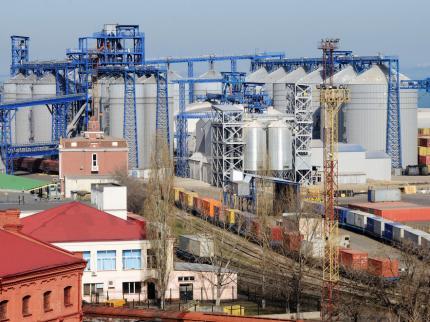
MOTYL: Mr. Monyak, as Executive Vice President for Eurasia at WorldBusiness Capital, how would you assess existing investment opportunities in Ukraine?
MONYAK: As an emerging market lender, I look for an overlap of two variables in an economy: undercapitalized mid-sized commercial enterprises that have the capacity for sustaining high growth rates, especially through export earnings, and a local financial sector that is well-regulated, but insufficiently funded to serve the needs of those enterprises. This overlap creates the opening for an outside source of funding to make loans and equity investments that have an appropriate balance between risk and return. Since the Orange Revolution in 2004, Ukraine has shown the potential for establishing itself as a prime emerging market opportunity in the context of those two variables. However, domestic politics, global economic shocks, and geopolitical forces have conspired, often in combination, to undermine that potential, which remains far from being realized. Nevertheless, we’ve persevered through Ukraine’s turmoil of the last decade to develop and maintain a performing portfolio of loans, albeit at levels far below what we could have done had there been greater stability.
MOTYL: Are you expecting the Ukrainian economy to get going in 2016?
MONYAK: I think that there will be some economic growth in 2016, in the range of 1.5-2.0 percent. Already in the first few months of the year there have been some signs of recovery in industrial production. This uptick comes after two years of economic contraction: 10 percent in 2015 and almost 7 percent in 2014.
MOTYL: How will this likely improvement affect investors?
MONYAK: For the foreign investor, there isn’t enough visibility either in Ukraine’s politics or economy. Leaving aside the Russia factor, the infighting and squabbles within the Ukrainian government over fundamental issues such as the pace of economic reforms and the measures that need to be undertaken to combat systemic corruption signal to the outside investor community that no strong political consensus has yet emerged to provide a hospitable environment for foreign investment. But I think it’s worth distinguishing among investor classes. The likelihood is low, for example, that American institutional investors—a relatively cautious group when it comes to investing in the former Soviet space for a whole host of reasons—will be active in Ukraine this year. But it’s a different story when we’re talking about investors based in Europe or the Middle East who, due to geographic proximity along with limited high-growth opportunities in their home or regional markets, start out with a higher comfort level than their American counterparts. If Ukraine’s assortment of crises does not worsen and the newly-constituted Hroysman government appears stable and capable of instituting appropriate reform-minded measures, then I would expect an uptick in investor interest in mid-sized projects, especially those involving foreign companies that have been active in Ukraine previously.
MOTYL: Investors also have long memories.
MONYAK: Exactly. The stories of investors who were burned in Ukraine by raiding scandals, the absence of an enforceable property rights regime, and the monopolistic practices of oligarchs are well-known and will not be simply forgotten just because investors can now purchase assets at prices that are at unprecedented lows. The good news is that enough investors are watching and waiting closely for clarity and visibility: for an end to the “one-step-forward, one-step-backward and one-step-to-the-side” sequence with respect to reforms. Once a strong signal is given—say, the new government meets the conditions for the release of the $1.7 billion third installment of IMF assistance which has been delayed since last October and institutes measures to reform the Public Prosecutor’s Office and the courts—I believe that investors will react positively and in a reasonably short time-period. If the Ukrainian politicians move quickly, we could see growth and investment toward the latter portion of 2016.
MOTYL: That refrain—“if the Ukrainian politicians move quickly”—has been heard many times since 1991.
MONYAK: Perhaps I’m being Pollyannaish, but, sooner or later, even Kyiv has to be able to get things right.
MOTYL: How do investors view the new government?
MONYAK: Again, I’m going to refer to distinctions among the investor audiences. Americans, especially, were hoping and expecting the formation of a “technocratic” government in March, and the greatest hope was pinned on Finance Minister Natalie Jaresko becoming the Prime Minister and having a free hand to name her cabinet. When that scenario didn’t materialize, there was not only disappointment, but also the premature conclusion that the appointment of Volodymyr Hroysman, a Poroshenko ally, to the post signified a suspension of the reform process and Ukraine’s return to some form of its crony capitalist past. It’s early still, but this viewpoint has been sufficiently widespread in the mass and specialized media to snuff out any budding interest in Ukraine among US-based investors. But let’s talk about two other significant audiences. First would be the Ukrainians themselves—local investors—who perhaps were a bit more skeptical than foreigners about the likelihood of the technocrat scenario and are driven less by the vicissitudes of corruption measures and transparency indicators. It’s the devil they know, after all. If the Hroysman government demonstrates stability, staying power, and a reasonable adherence to the reform course, then these factors should be sufficient to cause a rise in local investment, whether its hryvnia-denominated capital within the country or hard currency financial flows from family offices in Europe whose beneficiary owners are Ukrainians. In turn, a show of confidence in the new government by local investors will catalyze the investment activity of the second audience, the development financial institutions (International Finance Corporation, European Bank for Reconstruction and Development, etc.) that have always represented a major source of foreign investment in Ukraine and did not suspend their programming at the height of the crises in 2014-2015. By design, development banks can mitigate medium to high levels of political risk, but to unlock the substantial pools of capital available to them, they need to partner with other private-sector investors, both local and foreign. To the extent that the Hroysman government reduces uncertainty and spurs local and some foreign investment, I’d expect to see increased development bank financing as well.
MOTYL: Which sectors of the Ukrainian economy are of greatest interest to investors such as yourself?
MONYAK: With a country that’s the second largest exporter of grains worldwide, you have to start with the agricultural sector. For the foreseeable future, the world demand for basic foods will be on an upward trend and Ukraine will play a major role in meeting that demand, whether it’s for corn, wheat, barley, sunflower oil, soy, or poultry products. In terms of output, Ukrainian agriculture will benefit greatly from additional investments in machinery for cultivation, storage, and transportation of product. I’d also cite the IT sector. Ukraine has an abundance of programming talent. The country is said to have the largest number of software engineers in Central and Eastern Europe. Over 100 global companies already have software R&D facilities in Ukraine. Other promising sectors are energy, both traditional and renewable, health care/pharma, and financial services.
MOTYL: Won’t the ongoing war with Russia deter Western investors?
MONYAK: There’s no question it will, and the Russians are quite aware that this is part of the price that they want Ukraine to pay for not capitulating to their demands for ending the conflict. War makes news. War heightens outsiders’ perceptions of political risk, no matter how effectively those seeking investment can explain that the war is highly unlikely to expand beyond its current borders and that, by all indicators, the military conflict has simmered down to a level that is far below where it was a year ago. “Isn’t there a war going on there?” That’s the most common reaction from a potential investor when approached about an opportunity in Ukraine. This being the case, it’s difficult to see how Western investment will flow into Ukraine in meaningful volumes while the guns are still active in the Donbas. This is not to suggest that there isn’t a unique category of investor who can measure and mitigate the political risk associated with the war, but these are individuals who know the Ukrainian landscape quite well and have most probably invested there previously with some success. At present, the number of investors who fall into this category is relatively small.
MOTYL: What do you expect of Ukraine’s economy in the foreseeable future?
MONYAK: Notwithstanding all the hindrances to Ukraine’s development that we can cite today, I remain optimistic that they will be overcome over the next few years and that the country will be well on the way to becoming a vibrant emerging market with significant economic growth and diversification. The growth will be distributed over a broad range of economic sectors.
MOTYL: Aren’t you making Pollyannaish assumptions in making this prediction?
MONYAK: I hope not. I start with the premise that the conflict with Russia will be resolved one way or another, if for no other reason than that Russia needs to re-engage with European financial institutions and will be eager to reach some lasting agreement with Ukraine on the Donbas in order to have the sanctions removed. And it doesn’t really matter whether that resolution leaves the Donbas as part of Ukraine de facto or de jure. All that’s important is that, with a genuine military disengagement, Ukraine can focus its attention and resources on its other pressing problems. I also assume that that a serious level of reform-minded consensus among political elites supported by a stable parliamentary coalition will emerge soon in Kyiv, though whether that happens in 2016 or 2017, I cannot predict with any degree of certainty. With a resolution of the Russian conflict and a stable government committed to institutionalizing a law-based, reasonably transparent market economy, all of the positive aspects that one can highlight about Ukraine—the highly educated work force, the unlimited capacity of the agricultural sector, the industrial base, the transportation linkages, etc.—will become the basis for a dynamic and growing economy that will attract increasing volumes of foreign direct investment. Even in the best of circumstances, the debt overhang and other legacies of Ukraine’s crises will limit the growth rates to the low single digits in the near term. But looking out over a longer time frame, say from 2020 onwards, we shouldn’t be surprised to see annual growth rates reaching the 5-10 percent range.
MOTYL: Ukraine as an East European tiger?
MONYAK: That reminds me of the Bill Gates quote, “We always overestimate the change that will occur in the next two years and underestimate the change that will occur in the next ten.” In Ukraine’s case, if the country can finally catch a break with respect to the external factors, then I’d say that the Slavic tiger could be roaring within 5-7 years. I don’t think that people realize just how far Ukraine has dropped economically since the onset of the crises. Even after adjusting for the loss of the Donbas, the economy could grow at very high rates for several years in a row without reaching the level it was at in 2013. With growth rates reaching 7 percent or 8 percent five years from now, Ukraine has the potential to become a very attractive destination for investment of all kinds. That being said, there’s much to be done in Kyiv before that vision can become a reality.
OG Image: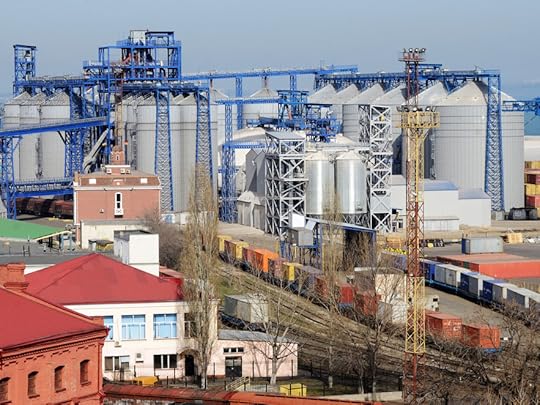 Europe and Central AsiaUkrainePresidentVice President
Europe and Central AsiaUkrainePresidentVice President
April 25, 2016
Putin Celebrates Unrepentant Fascist Zhirinovsky
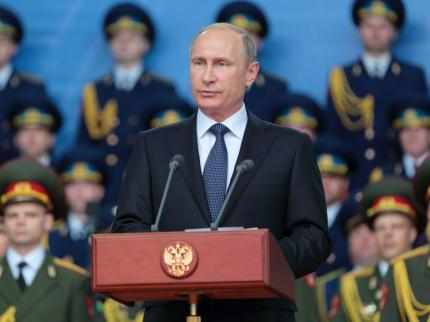
This time, Vladimir Putin has out-Putined himself.
On April 18, Russia’s erratic, though consistently anti-democratic, leader awarded the Russian Federation’s prestigious “For Service to the Fatherland Order, Class II,” to none other than Vladimir Zhirinovsky.
Zhirinovsky, who is the head of the bizarrely named Liberal Democratic Party of Russia, has been an unabashed promoter of Russian illiberalism, fascism, and imperialism since he first made a splash in the Duma elections of 1993, when his party garnered 23 percent of the vote.
Zhirinovsky has never minced his words. To his credit, he’s never pretended to be anything but an imperialist and a fascist. Indeed, he’s been so brazen, so outrageous, and so unapologetic that not even Putin Russia’s most ardent Western apologists apologize for him.
Here’s a classic Zhirinovsky statement threatening Eastern Europe with war, from August 2014:
Poland—the Baltics—they are on the whole doomed. They’ll be wiped out. There will be nothing left. Let them re-think this, these leaders of these little dwarf states. How they are leaving themselves vulnerable. Nothing threatens America, it’s far away. But Eastern Europe countries will place themselves under the threat of total annihilation. Only they themselves will be to blame. Because we cannot allow missiles and planes to be aimed at Russia from their territories. We have to destroy them half an hour before they launch. And then we have to do carpet bombing so that not a single launch pad remains or even one plane. So—no Baltics, no Poland.
Not enough? Here’s one more, from June 4, 2015, aimed at Odessa Governor Mikheil Saakashvili and Putin’s Ukrainian political prisoner, Nadia Savchenko:
We will shoot all your governors starting with Saakashvili, then they’ll be afraid, and there will be a different situation in Europe and Ukraine.... Let’s aim at Berlin, Brussels, London, and Washington, then they’ll agree and will promise to leave us alone… Shoot this Savchenko tomorrow and hang her in Belgrade.
By awarding the honor to Zhirinovsky, Putin not only legitimizes his ISIS-like barbarism, he endorses it. And by awarding the honor for Zhirinovsky’s “great contribution to the development of Russian parliamentarism and his active law-making work” (sic!), Putin repudiates liberalism, rule of law, democracy, and every international norm known to the civilized world—openly and unconditionally.
For Putin’s critics, this is no surprise. They’ve never had any illusions about his politics. For Putin’s Western apologists, the award is a moment of truth. If they fail to repudiate Putin’s celebration of barbarism, they will have effectively endorsed Zhirinovsky and his declaration of war on the West and its values. Both Donald Trump and Germany’s foreign minister, Frank-Walter Steinmeier, should remember that their knee-jerk Putinophilia is a rejection of everything the West represents. Russian recipients of the award—many of whom are respectable scholars, artists, and policymakers—face a similar choice.
The award to Zhirinovsky is important for another reason. His inclusion in his “Fatherland’s” political pantheon suggests that Russian political culture and geopolitical thinking are perfectly compatible with, and perhaps even supportive of, his extremist views. Zhirinovsky’s exaltation may mean that imperialism, illiberalism, and authoritarianism, if not downright fascism, are central to Russia’s perceptions of itself and its place in the world.
That’s exactly what realists such as former Secretary of State Henry Kissinger and University of Chicago political scientist John Mearsheimer believe. Similarly, Princeton University historian Stephen Kotkin argues that Putin’s foreign policy is a continuation of the traditional Muscovite imperial behavior of Peter the Great and Alexander I. Since their Russia will always be imperialist, aggressive, and authoritarian, Western policy can either appease it or go to war.
My own view is that the neo-fascist Putin regime’s policies of oppression at home and aggression abroad are the result of his determination to rebuild a Russian empire. The goal of US and Western policy should therefore be to contain Putin the dictator and wait for his regime’s inevitable demise. As negative as it sounds, my view is actually optimistic, resting on the hopeful assumption that Russians can be democratic and that Russia can and eventually will change.
OG Image: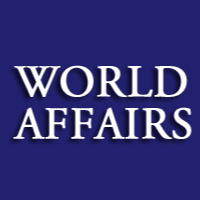 Europe and Central AsiaRussiaRussianVladimir Putin
Europe and Central AsiaRussiaRussianVladimir Putin
April 21, 2016
Ukraine’s New Cabinet
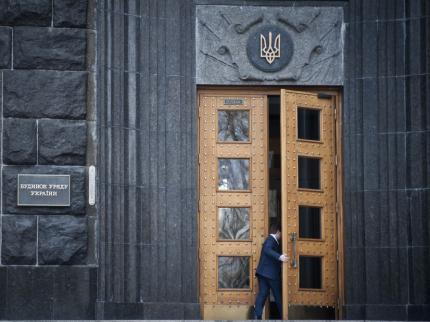
How should we evaluate Ukraine’s just-completed process of forming a new coalition and cabinet?
For starters, coalitions and cabinets are routinely changed in democracies. Devious presidents, devious prime ministers, and devious parliamentarians are also business as usual. So, too, are horse trading, smoke-filled rooms, shady deals, opportunistic bargains, and outrageous demands. Although these things usually dismay and demoralize non-politicians like most of us, their presence actually signifies that a democratic process is taking place.
That said Ukraine isn’t a run-of-the-mill democracy. It’s a transitional democracy mired in economic crisis and war. While other elites can squabble to their hearts’ content, those in Ukraine have a political and moral obligation to set aside personal ambitions and animosities and, in the national interest, find effective solutions quickly. When time is of the essence, one can’t waste two months, as the Ukrainians just did, trying to come up with a new coalition and cabinet. That’s criminal.
Blame President Petro Poroshenko for trying to exercise excessive control over the government. True, the conflict between president and prime minister is built into Ukraine’s parliamentary-presidential system, but a wise leader would not have provoked a crisis he could not immediately resolve. Blame former Prime Minister Arsenii Yatseniuk for pathetically clinging to office even when he and everyone else knew he was doomed. And blame opposition leaders Yulia Tymoshenko and the preposterous demagogue, Oleh Lyashko, for stoking the flames and Andrii Sadovy for refusing to help put them out.
In sum, all of Ukraine’s political elites failed to act responsibly.
Unsurprisingly, a recent poll shows that Ukraine’s president, cabinet, and parliament have abysmally low ratings. Only 17 percent of Ukrainians support or “tend” to support Poroshenko, while 75 percent do not. The cabinet gets the following ratings: 7 percent for and 89 percent against. The Rada’s numbers are: 5 percent for and 88 percent against.
The new cabinet with Prime Minister Volodymyr Hroysman can’t do worse.
Predictably, Ukraine’s chattering classes are already gleefully dooming the cabinet. But their expectations may be premature. The 38-year old Hroysman was an excellent mayor of Vinnytsia. He did well as speaker of the parliament for the last two years. The development and adoption of Ukraine’s ambitious decentralization plan was, in large part, to his credit. And, in conducting negotiations for the composition of the cabinet, he demonstrated that he had backbone and was not, as many charge, Poroshenko’s lap dog. Not bad for a young guy who could be my student. He may fail, of course, but then again he may not. In any case, the jury isn’t out. Indeed, it hasn’t been assembled.
The other key appointment in the cabinet is the finance minister, Oleksandr Danyliuk. The English-speaking Danyliuk has impressive credentials: he worked as senior consultant at McKinsey & Company in London, has an MBA from the University of Indiana, and helped initiate the National Anti-Corruption Bureau. True, he also served in some advisory capacity in the Yanukovych government, but that neither disqualifies him nor suggests he’s incompetent.
Not surprisingly, Hroysman’s and Danyliuk’s critics are pretty much the same people who insist that “nothing has changed” in Ukraine. That’s nonsense, of course, as I’ve repeatedly pointed out. But, if true, then Ukraine’s nattering nabobs of negativism have no logical grounds for criticizing the new cabinet and making unflattering comparisons between Danyliuk and his predecessor, Natalia Jaresko. If “nothing has changed,” then Jaresko is to blame as much as anyone else. If Jaresko’s departure is unfortunate—and it is—then something may indeed have changed.
Either way, the above-mentioned poll shows that only 14 percent of Ukrainians approve of Jaresko and 64 percent do not. In contrast, the loudmouthed Radical Party leader Lyashko received 23 percent for and 69 percent against. Decide for yourself what these numbers say about polls as measures of reform.
So, how will the Hroysman cabinet do?
We’ll know it’s doing well if the nabobs insist months from now that “nothing has changed.”
OG Image: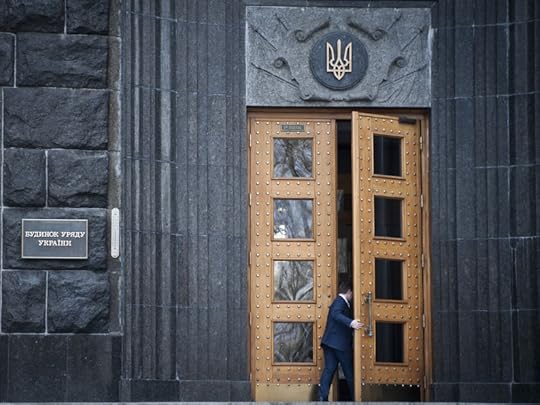 Europe and Central AsiaUkraineUS
Europe and Central AsiaUkraineUS
April 15, 2016
Ukraine: A Bridge Linking the West and Russia?
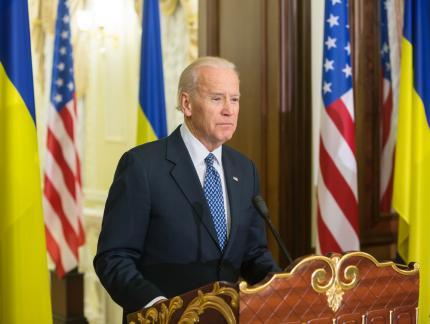
MOTYL: Dr. Valenta, you’ve had extensive experience dealing with the Russians during and after the Prague Spring and wrote a seminal work on its tragic denouement, Soviet Intervention in Czechoslovakia, 1968 (Johns Hopkins, 1991). Is there a solution to the ongoing Russo-Ukrainian war that would be acceptable to Ukraine, Russia, and the West?
VALENTA: Russian leaders abhor large, endless military campaigns and prolonged, costly wars. Many in Russia believe the war in Afghanistan led to revolutionary change and, in turn, to the 1991 fall of the empire. The Kremlin prefers low-cost interventions as in 1968 Czechoslovakia or bloodless ones as in 2014 Crimea.
The prerequisite for avoiding future intervention is deterrence: making it too costly for Russia to intervene. Strategists and policy makers should study the advice a Ukrainian general-turned-dissident, Petro Grigorenko, gave Prague Spring leader Alexander Dubček. Grigorenko advised blocking main roads to halt tank armadas and defending aerodromes so as to prevent strategic surprise. Dubček feared bloodshed and refused to follow Grigorenko’s advice. In southeast Ukraine, they did follow it, and Grigorenko’s advice proved to be correct and effective.
MOTYL: What model of security would work best for Ukraine?
VALENTA: Let’s start with what is not acceptable: NATO membership for Ukraine and Georgia, as proposed by Zbigniew Brzezinski repeatedly before 2007. As we know from former Defense Secretary Robert Gates, the French and Germans would never allow it, so as not to provoke Russia. After the Crimean invasion, Brzezinski turned to Finlandization as a neutrality model for Ukraine. I disagree with Brzezinski. Finland signed a 1948 agreement with Russia that provided for so called “consultations.” As interpreted by the Kremlin, this was a green light to interfere in the domestic affairs of Finland. Stalin vetoed Finland’s participation in the Marshall Plan before the treaty was even signed, while Khrushchev interfered at least twice in Finnish politics. Putin has interfered repeatedly in Ukrainian politics, so the Ukrainians have had a kind of Finlandization already and it hasn’t, and will not, work.
More appropriate for Ukraine is the Swiss neutrality model combined with elements of the Austrian one. But the perpetual neutrality treaty must be based on strong deterrence and well-trained, well-equipped, and professionalized armed forces. Perhaps, as in Switzerland, there should also be a dispersed militia with weapons kept at home. Clearly, the West would have to arm Ukraine with defensive weapons. The army’s budget would have to be increased and supported by Ukraine’s rather impressive defense industry. There should also be fortifications in the Carpathian Mountains as in the Alps. This would signal to the Russians that Ukraine’s army would be prepared to retreat and conduct a guerrilla war in and from the mountains, if necessary. Remember the Ukrainian partisans continued to fight the Russians for a decade after World War II and Putin knows it. An international treaty between Great Powers could be modeled after the agreement the Austrians negotiated in 1955, which provided for the withdrawal of Russian forces, without permitting Russia’s interference in Austria’s internal affairs, as was the case with Finlandization.
MOTYL: Could Ukraine join the European Union in this scenario?
VALENTA: That’s not likely now. An Association Agreement was signed in June 2014. The Deep and Comprehensive Free Trade Area went into effect on January 1, 2016. Areas regarding political cooperation have been provisionally in effect since November 2014. Tragically for Ukraine, however, the European Union’s cohesion has been under increasing and unrelenting economic and other pressures for nearly a decade. And now the refugee deluge has given Europe’s separatists yet another issue in their efforts to separate from Brussels. President Obama’s neglect of the Syrian conflict has had serious consequences for Europe and Ukraine. Europe is in deep crisis and will have a hard time overcoming it. Poland just closed its borders following Hungary’s lead. Great Britain might withdraw from the EU and the French and the Poles may yet revert to national currencies.
The recent Dutch referendum is a case in point. Some, like Anne Applebaum, claim the vote was “a good example of how Russian influence actually works in a western European election.” But a Dutch government adviser disputed that, suggesting to me privately that the referendum “was primarily a protest vote against the EU and national leaders.” Significantly, the Dutch government, which rallied in favor of the Agreement, currently chairs the 6-month EU presidency.
Given these EU uncertainties and the evolving crisis—not to mention Ukraine’s array of challenges—it’s unrealistic to think the EU will be adding member states in the foreseeable future. Therefore, I would advise Ukraine to pursue the role of a neutral state, along the lines prescribed by Henry Kissinger, and serve as a trade and communications bridge between Russia and the West rather than a bulwark.
MOTYL: The problem with the bridge image is that most Ukrainians reject it. They say they tried it for 25 years and the result was a Russian invasion. They also say that bridges get trampled upon.
VALENTA: What the Ukrainians tried was a kind of Finlandization, but one not supported by armed, Swiss-type neutrality. It could work, but only if the West finally delivers defensive weapons to the Ukrainians.
MOTYL: Why should Russia agree to any of this?
VALENTA: The most pressing rationale for Russian cooperation with the West is the economic cost of its intervention in Syria and Ukraine and now in the Russo-Turkish proxy war in the Caucasus. The Russian economy is in crisis. Oil prices will remain low for the foreseeable future, and Russia is dependent for 60 percent of its income on oil and gas exports. Think of Russia as a large gas station. Part of the package with Russia should be stronger economic cooperation, gradual reduction of sanctions, and ending the information war.
The other reason is Islamic terrorism. With a new American president in 2017, we can hopefully convince the Russians it is in their interest to work with the West against ISIS, because it is. There are still more than 4,000 fighters from the North Caucasus in Syria. Some will surely attempt to return home and build a caliphate there.
Putin is hoping for the outcome of American elections to be good for Russia. Not surprisingly, he praised Donald Trump during the primaries, because of Trump’s strategy of wanting a limited partnership with Russia against the Islamic threat.
MOTYL: Are you also suggesting that the United States offer Russia great-power status in the Middle East?
VALENTA: We must get rid of our Cold War view that Russia cannot have a naval and air force base in Syria. We have bases in the Mediterranean. Why shouldn’t the Russians have one in Syria? The Israelis understand this better and have worked out an agreement with Russia. We live in a different era, and our cooperation on Syria with Russia could eventually bring peace to that country and could impact positively on Ukraine.
MOTYL: Who would broker a neutrality agreement?
VALENTA: It must be the United States, still the indispensable power. It could definitely not be Chancellor Angela Merkel. Because of the immigration crisis, Merkel’s party has already lost several regional elections and it seems unlikely she will remain in power for much longer. The Europeans will be spending most of their time and money building border walls, controlling immigration, and moving Muslims back to the Middle East. Ukrainians should have no illusions that the EU can help them too much.
MOTYL: Can you really imagine a President Trump brokering such an agreement? His statements suggest he’s more likely to ignore Ukraine.
VALENTA: Trump is not sufficiently briefed on the importance of conflict avoidance over Ukraine. He still has several months to learn and hire the right people. On Russia, he has someone who specializes in economic investment. He still needs a genuine expert. To have a limited partnership with Russia on terrorism and energy, he needs to resolve the source of potential conflict with NATO: Russian interventionism in Ukraine.
MOTYL: How do Crimea and the occupied Donbas fit into your scheme?
VALENTA: A special clause for the autonomy of the Donbas could be included in the final “Swiss-Austrian-like” neutrality treaty, supportive of economic intercourse between Russia and the industrial southeastern Ukraine. One thing is certain: Moscow will not give up Sevastopol, the home of its Black Sea Fleet, which links Russia with the Middle East. The invasion of Crimea was not just retaliation for revolution in Kyiv, but a long-planned measure to ensure the continued use of this port.
In future negotiations, the US could treat Crimea as it did the Baltics after the Soviet “liberation” in 1945. We didn’t recognize the Russian annexation de jure, but we lived with it de facto until the Balts regained their independence in 1991. Meanwhile, Ukraine and Russia might agree on some confidence building measures involving economic cooperation.
MOTYL: Cooperation is highly unlikely as long as Russia continues to maintain 35,000 armed thugs in eastern Ukraine.
VALENTA: Agreed.
MOTYL: You seem to be proposing a quid pro quo: Russia ceases its aggression, while Ukraine acquiesces in the Russian annexation of Crimea and the eastern Donbas. The problem is that Kyiv cannot accept Russia’s word on anything until Ukraine has the capacity to defend itself against another Russian attack—which may be several years from now. Moreover, won’t international acceptance of Russia’s invasion of Crimea just encourage Putin to make other border adjustments in, say, Estonia or Kazakhstan?
VALENTA: I am not proposing the annexation of the eastern Donbas. It must stay part of Ukraine. I am proposing an equitable and realistic solution for both parties. The new US President (hopefully one the Russians will respect) can provide arms to Ukraine quickly while also negotiating with the Kremlin. Putin must know that any attack on a NATO member like Estonia or Turkey will lead to general war. He’s much too busy to invade Kazakhstan: he must deal with the existing war in eastern Ukraine and the emerging proxy war with Turkey in the Caucasus. After 21 years of peace, war has again erupted between Azerbaijan and Armenia over Nagorno-Karabakh. Putin backs Armenia. The Turkish president says he will support Azerbaijan “to the end.” A ceasefire is unlikely to be permanent.
As the prominent Russian analyst, Andrei Kortunov, warned the Kremlin, the attempt of “any exalted politicians” to punish Turkey is fraught with danger because of Turkey’s ability to support the Turkic peoples in the Crimea, Syria, and Azerbaijan.
MOTYL: Should Ukraine pursue an alliance with Turkey?
VALENTA: Ukrainian President Petro Poroshenko recently met with President Erdogan for what they called “strategic cooperation,” presumably with respect to intelligence sharing and small arms transfer. But there is little Turkey can do to prevent a Russian intervention in the direction of Mariupol, nor can Ukraine counter Russia’s strategic encirclement of Turkey. The key is in Putin’s hands, in America’s providing Kyiv with defensive arms, and in America’s ability to successfully engage in preventive diplomacy.
As the world appears to be slipping into regional and, God forbid, global conflict, the West needs to be more active in its pursuit of equitable, diplomatic resolutions of multiple crises. Brokerage between Turkey and Russia by Egyptian President Abdel Fattah El Sisi is another possibility. He is friendly with both leaders.
Meanwhile, whoever wins the US election has to realize that America must resume its historic role as leader of the free world. It must both deter and negotiate with Russia to prevent these crises from reaching critical mass.
OG Image: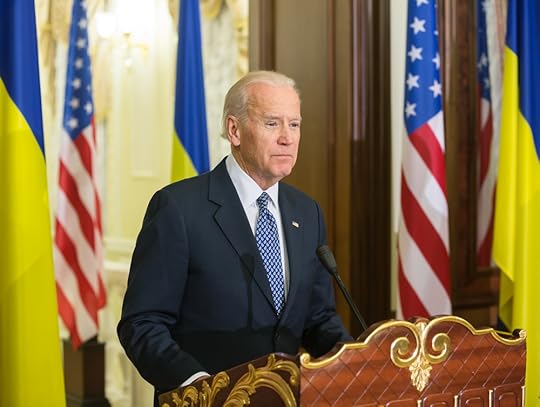 Europe and Central AsiaUkraineRussia
Europe and Central AsiaUkraineRussia
April 7, 2016
The Dutch, Kyiv, and Reform
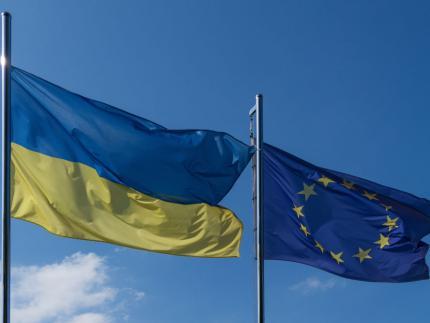
The Dutch referendum is not the end of the world for Ukraine. As one smart and sober Ukrainian analyst points out, it actually changes very little in Ukraine’s relationship with the European Union. In a word, Ukraine need not panic.
That said, Ukraine needs to draw several conclusions from the decision by some 20 percent of Holland’s electorate to reject the EU’s Association Agreement with Ukraine.
First, that percentage of nay-sayers roughly corresponds to the percentage of citizenry in all EU states who actively reject “European values.” These are the supporters of extreme right-wing parties, many of which of late have attained 20-30 percent of the vote in various elections. These are the people who disagree with the following passage in the Preamble of the Charter of Fundamental Rights of the European Union:
Conscious of its spiritual and moral heritage, the Union is founded on the indivisible, universal values of human dignity, freedom, equality and solidarity; it is based on the principles of democracy and the rule of law. It places the individual at the heart of its activities, by establishing the citizenship of the Union and by creating an area of freedom, security and justice.
These people will never support Ukraine or many other bilateral and multilateral relationships.
Second, probably as many if not more Europeans view European values in the same manner that former German Chancellor Gerhard Schröder and a lot of his comrades in the German social-democratic party do: they’re fine, as long as they’re not inconvenient. If rights imply inconvenience or if indifference to rights entails profit, then who needs rights? Schröder, if case you’re forgotten, finagled a cushy job with the Russian mafia-like state firm, Gazprom, while still in office. And he’s been lobbying for Vladimir Putin, apologizing for his imperialism, and lining his pockets with rubles ever since.
The European Schröders will support Ukraine only if it’s profitable and convenient.
The rest of the Europeans—a third, maybe more—sincerely believe in European values. These are the people who believe in the EU, believe in NATO, support sanctions against the mafia in the Kremlin, and largely welcome Middle Eastern refugees regardless of the cost or inconvenience that their arrival in Germany entailed.
These Europeans will support Ukraine, but only if no other, more pressing human rights issues require their immediate attention.
EU officials break down into these three categories as well, though the set of true believers in Eurovalues is probably greater than in the population at large.
The lessons for Ukraine are several:
First, it cannot count on Europe to do the right thing. Appeals to human rights, common European values, the sacrifices Ukrainians have made to join Europe—all this will fall on mostly deaf ears in about two-thirds of the population. So is the fact that thousands of Ukrainians have died defending Eurovalues against Russian imperialism.
Second, regardless of what the Europeans do or say, Ukraine should continue to do everything it can to join Europe and adopt Eurovalues. Western political and economic institutions actually do work—even if those of the EU may not—and Western values (such as human rights, democracy, and rule of law) are far better than those promulgated by the Putins of the world.
Third, Ukraine must realize that its progress toward Western institutions and values depends almost exclusively on itself. Europe won’t go out of its way to help it; neither will anybody else, including the United States—if Ukraine’s doesn’t start measuring up to western governance and rule of law standards. Ukraine must become a strong, rich, democratic country by adopting policies that promote strength, wealth, and democracy.
Fourth, once Ukraine is strong, rich, and democratic, Europe—including the Eurovalue nay-sayers and the Schröder-like opportunists—will come knocking on its door.
Fifth, for Ukraine to become strong, rich, and democratic, its elites finally have to get their act together and govern like mature elites and not children.
What the Dutch did is shameful: they betrayed decency and Ukraine. But what Ukraine’s squabbling, incompetent, self-serving, shortsighted elites are doing is even worse: they’re destroying Ukraine and its people.
OG Image: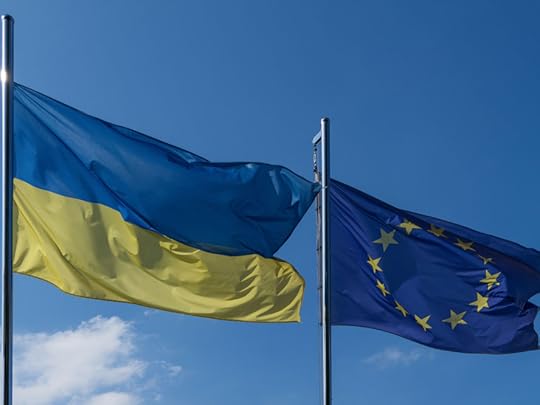 Europe and Central AsiaNetherlandsUkraineEUEuropean UnionEU
Europe and Central AsiaNetherlandsUkraineEUEuropean UnionEU
April 5, 2016
Is Ukraine's Economic Potential Its Destiny?
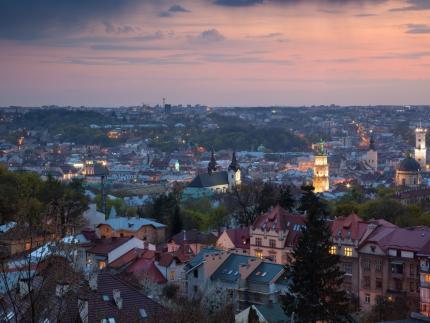
The following is an interview with Ukraine investor, Ian Hague.
MOTYL: As a Founding Partner of Firebird Management LLC, a fund management company focusing on the capital markets of the former Soviet Union, you’ve pursued investment opportunities in Ukraine since 1994. Whence this long-standing interest?
HAGUE: Ukraine has fundamental appeal as an investment destination. The list of its attractive features is pretty well known by now: a large, generally urbanized, well-educated population, proximity to Europe and excellent transport links to world markets, an important industrial base combined with what was and could again be one of the most productive agricultural sectors on the planet. The mandate of our fund is to identify and make long-term equity investments in promising companies that have the potential to be global leaders in their field of business. At the moment, Firebird has investments in a large Ukrainian poultry producer that is a public company listed in London. In the course of our investing in the country, a number of opportunities did not work out for us due to poor corporate governance and weak enforcement of property rights, but this is a situation we have encountered in many other countries of the former Soviet Union and we are confident that, as long as there is consistent progress in reforming the ways the government operates and enforces laws, more opportunities will emerge for us.
MOTYL: What do you expect of Ukraine this year?
HAGUE: We are very confident in the Ukrainian economy’s prospects for 2016. First, the output decline and currency devaluation of 2015 have now abated. There is the phenomenon of “snap-back” growth that occurs whenever there is a steep devaluation of the currency and the current account is brought into balance. Now that an IMF program is in place with strict conditionality, investors have more confidence in the macroeconomic outlook for the country. But the key to attracting investment is the micro-economic outlook. Progress in reducing corruption and deep reform of all of Ukraine’s legal and judicial institutions is urgently required to attract international investment. The legacy of a Russian-style “mafia-state” approach to private property and entrepreneurship must be destroyed. I am hopeful that significant progress can be made in this area this year, once a more effective government is in place. Investors were generally excited to see Western economists and business people join the government last year, but now that the usual political obstacles are reemerging, a little of the bloom is off the rose with regard to investor expectations. The hope is that the will of the Ukrainian people as expressed at Maidan for a broad-based battle against corruption and oligarchic interference in government will be heeded.
MOTYL: Which sectors of the Ukrainian economy are of greatest interest to investors?
HAGUE: Given the re-establishment of macro-economic equilibrium and the deep devaluation of the hryvnia, the first place to look would normally be in the financial sector, as returns on equity and loan margins should be very attractive. Beyond that, we are considering additional investments in the agri-business sector, particularly those companies that are exporters of agricultural products. The decline in hryvnia-based costs as a result of devaluation have automatically made these companies more globally competitive and profitable. As Ukraine’s economic recovery continues, we will also be looking to invest in companies that serve the local market, such as retail businesses and possibly real estate. I say “possibly” because the rule of law issues that create risks in those sectors have not yet been addressed to the satisfaction of foreign investors. Back in the boom years of 2005-2007, which was the last period of significant inflows of foreign capital into Ukraine, investors were not sufficiently alert to these risks and it cost them dearly. Investors learned a lesson. And, now the government really must make progress in creating more transparent trading markets in land and real estate. I understand the political sensitivity of foreign ownership of agricultural land, but since this sector probably has the greatest potential for rapid growth, I think Kyiv would be wise to establish clear and consistent rules and treat investors in an even-handed manner in the enforcement of rules.
MOTYL: How does the ongoing war with Russia affect your calculations?
HAGUE: The war in Donbas has now calmed down enough so that it no longer represents an insurmountable obstacle to attracting foreign investment into Ukraine, as long as other conditions are in place. I think the current government too often uses the war as an excuse for not doing the difficult political work to combat and defeat corruption. There seems to be a view in officialdom in Ukraine that the good will of the outside world in supporting Ukrainian aspirations depends on continually being at war. This is not true. Realizing Ukrainian aspirations for deeper integration with the EU and NATO depends much more on progress in creating a modern, effective, and accountable state system than on the status of Donbas.
MOTYL: Corruption and weak of rule of law are generally considered to be the main obstacles to foreign direct investment in Ukraine. Does Ukraine differ in this respect from other post-Soviet states?
HAGUE: I think that, compared to other countries in the former Soviet Union with broad and deep corruption problems, Ukraine is unique in having a government whose principal claim to legitimacy is that it has credibly committed to do something about it. Given that Ukraine has a strong civil society with a track record of compelling accountability from its leaders, I have confidence that progress can be made on the corruption and rule of law issues, but it will be hard work. As in Russia, the administration of justice is still more a profit-oriented business than a function of government. This is intolerable and greatly undermines the authority and legitimacy of the state. For entrepreneurs it makes setting up and operating new businesses unthinkable without the right “connections.” Foreign investors do not have the time or the inclination to seek out such connections and no confidence that, once they have found partners, their partners won’t use those same corrupt law-enforcers and judges to prey on them. It’s simply too difficult and too costly to formulate contracts that are completely self-enforcing all the time. Law matters. And, where there is no rule of law there is no security, and the serious investors of the world will simply invest elsewhere.
MOTYL: Odessa Governor Mikheil Saakashvili is considered to be a corruption-fighting savior by some and an authoritarian leader prone to corruption by others. You’ve met Saakashvili. What’s your view of him?
HAGUE: I have known Saakashvili since he first became President of Georgia back in 2003. We made a series of very successful investments there and I had the chance to watch him closely. I don’t approve of everything he did in the area of party politics, and he seems to have overestimated the degree to which his supporters outside Georgia would endorse his actions, especially in the later period of his presidency. But I consider Misha Saakashvili’s record in implementing economic reform and combating corruption to be unimpeachable. In his time in power Saakashvili truly transformed the relationship between state and citizen in Georgia. He moved Georgia out of the swamp of mafia-state-style governance by dramatically reducing the scope of government in such a way that the economy responded almost immediately. Georgia was helped significantly by the absence of natural-resource rents for corrupt operators to exploit and by the presence of effective, Western-trained professionals who came back to Georgia to participate in government and business. By eliminating regulation in a broad array of areas, and reforming and re-training virtually everyone in the government involved with public administration, law enforcement, and criminal and civil justice, whole new areas were opened up for economic activity and investment. In Georgia it’s now dead simple to start a business, to pay your taxes, to use the courts to resolve disputes, and to wind up your business if needed. At every point, the degree of government interference is minimal. It’s really a great place to do business, as a lot of the official “corruption tracking” indices like the World Bank Ease of Doing Business survey and the Transparency International Corruption Perceptions Index attest. What is more, these changes were all enormously popular, so much so that they have been preserved since he has been out of government. When the stars align in Ukraine’s political constellation, similar reforms will be adopted in Ukraine, and like in Georgia, the reforms will stimulate investment, entrepreneurialism, and the growth in Ukraine too. But, frankly, time is short. There is a growing feeling of “compassion fatigue” in Europe and the United States and multilateral economic help for Ukraine is losing political support in the absence of dynamic political leadership promoting anti-corruption efforts and reform in Kiev.
MOTYL: How does Ukraine’s younger business elite compare and contrast with businesspeople in Russia and the West?
HAGUE: Ukraine’s younger entrepreneurial class is every bit as talented and capable as entrepreneurs I have met in Georgia, Russia, Kazakhstan, or Estonia. I have met a variety of professionals at work in software startups, outsourced programming shops, and innovative retail businesses. In the finance field, you have a number of thirty-ish investment bankers who now have several years of experience working with Western investors and are very capable in structuring corporate finance deals. The problem is that, at the moment, the entrepreneurs would rather domicile their businesses outside of Ukraine because the business environment remains too unpredictable and risky as a result of corruption. For their part, the investment bankers have little to do, because large Ukrainian corporates are either still owned by the state or controlled by oligarchs, or sometimes by both. On the local capital market, the shares traded are such a small
percentage of the capital of the listed companies that they are the objects of manipulation and unsuitable as indications of the value of firms. With more privatization and the development of a domestic bond market, Ukrainian corporates could be raising capital from domestic investors, including private pension funds. But a vast overhaul of all the institutions of the capital market will be necessary before this can happen.
MOTYL: Where do you expect Ukraine to be economically in the next few years?
HAGUE: Assuming a new momentum is imparted to the reform process, I could see economic growth in the 4-5 percent range in the next few years. There is strong investor interest in Ukraine and, once there is confidence in the investment environment, it would not take much to start an investment boom there. I think the recovery will be felt first in the area of agricultural exports, followed by renewed foreign capital inflows into real estate and banks.
OG Image: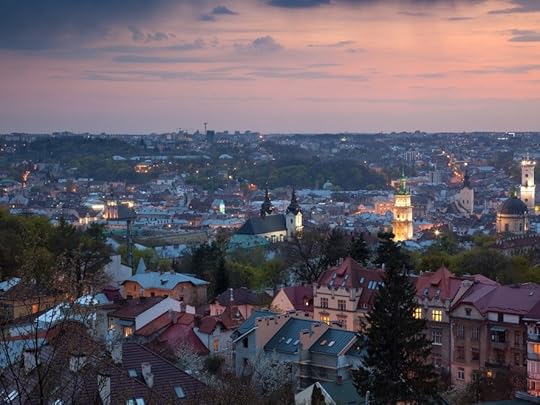 Europe and Central AsiaUkraine
Europe and Central AsiaUkraine
March 29, 2016
Ukrainian Identity After the Euromaidan
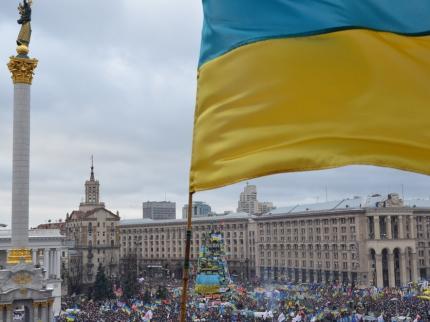
The following is an interview with the Ukrainian intellectual, analyst, and critic, Mykola Riabchuk.
MOTYL: You’ve stated that independent Ukraine has never had a government as good as the one it has today. As you know, most Ukrainians think of their president and prime minister as corrupt and untruthful. Who’s right?
RIABCHUK: I meant only that a bad government is better than very, very bad governments, which is what we’ve had up to now. The incumbents deserve a minimal pass, whereas all their predecessors deserved Fs. Most countries can live with bad governments, but not Ukraine, especially given the war and the institutional ruin created by past governments.
I’m not sure the incumbent president and prime minister deliberately engage in premeditated duplicity and mendacity, as was the case with Leonid Kuchma, Viktor Yanukovych, and Yulia Tymoshenko. Rather, they don’t keep all their promises or uphold their moral principles. But this is true of all politicians who face difficult trade-offs. People’s high post-revolutionary expectations make the problem particularly conspicuous.
The charge of corruption is especially serious, but neither Ukrainian nor international watchdogs have proof of their personal involvement in such schemes. My personal feeling is that the president and the prime minister lack the political will to curb corruption among their political allies, sponsors, and closest friends. They use corruption as a key instrument of patrimonial rule. This strategy undermined Viktor Yushchenko’s rule and led him to defeat. The same will very likely happen to President Poroshenko.
At the same time, the popular view that “nothing has changed” and that “corruption has grown worse” is nonsense. There’s no comparison between today’s wrongdoings and the complete state capture under Yanukovych. The Transparency International index is misleading, as it reflects perceptions of corruption. Those have increased, partly because of very high post-Maidan expectations and partly because of the huge daily flow of information about official misdeeds. Ukrainian civil society is more active and vigilant than it ever was, and Ukrainian media are free and determined to fight for the public good.
Popular perceptions are right to view our state apparatus as thoroughly rotten. It cannot be fixed from inside; some international supervision and guardianship is needed. I don’t exclude outsourcing Ukraine’s customs or tax service, or its Supreme Court, to international bodies created in agreement with the UN.
MOTYL: You’ve written extensively about Ukraine’s bifurcated identity. What is this bifurcation about and is it being overcome?
RIABCHUK: The bifurcation concerns the degree of mental emancipation from the supra-ethnic, quasi-spiritual entity constructed 300 years ago by Peter the Great, who fused political loyalty to his new-born empire with the traditional religiosity of Orthodox Slavdom. Ukrainians and Belarusians were officially redefined as subgroups of “Russians” (“almost the same people,” in Putin’s parlance). This identity legitimizes repressing a separate Ukrainian and Belarusian national identity and precludes the development of a modern Russian national identity.
During the past two centuries, Ukrainians made great strides in emancipating themselves from this archaic supra-ethnic community. Yet, the degree and speed of the emancipation were uneven in different parts of the country (being much more successful in the territories outside Russian/Soviet control) and in different strata of society. The main identity split today stems not from different levels of patriotism or support for national independence but from different levels of emancipation from the East Slavonic “Ummah.” One part of Ukrainian society has nothing to do with this mythical imaginary community. Another part has residual loyalties of different intensity to that virtual world. These loyalties do not undermine their Ukrainian identity and patriotism, but they definitely undermine their openness to the West and to modern, liberal democratic, anthropocentric values that have a clear Western provenance, at least in our part of the globe.
MOTYL: How have the Euromaidan Revolution, the ongoing war with Russia, and the loss, whether permanent or temporary, of Crimea and eastern Donbas affected Ukrainian identity and Ukrainian perceptions of Russians?
RIABCHUK: About 10 percent of Ukraine’s population live in territory now controlled by separatists. For the most part, these are people with a predominantly Soviet, East Slavonic, or genuinely Russian identity. But the rest of the population has undergone substantial changes in the way they identify themselves. The Euromaidan Revolution and especially the ensuing Russian aggression have substantially subverted the imaginary Ukrainian belonging to a mythical East Slavonic “brotherhood.” Ukrainian society is less ambiguous today and Ukrainian identity is becoming increasingly civic rather than ethnic, and increasingly incompatible with a supra-ethnic, non-civic, quasi-religious, East Slavonic identity.
While civic unity and civic identity are on the rise, Ukrainian attitudes toward Russians remain rather positive, in contrast to the highly negative Russian attitudes toward Ukrainians. First, Ukrainian media do not practice hate speech and propagandistic brainwashing on the scale of the Russian media. And second, Ukrainians are much less inclined to identify the people with the state; their loathing of Putin has not translated into a similar attitude toward common Russians. Many Ukrainians still want open borders and good relations with Russia, even though that’s increasingly impossible at a time of war.
MOTYL: Will Ukraine ever become a country in which the majority of the population prefers to speak Ukrainian in public?
RIABCHUK: Most Ukrainians speak Ukrainian on a daily basis. While a clear majority speak Ukrainian at home, somewhat less do so with friends or colleagues at work. But very few dare speak Ukrainian in the public spaces of big cities. There’s a simple reason for that. All Ukrainian urban centers have a long tradition of social domination of Ukrainian speakers by Russian speakers, with all the concomitant quasi-racist mockery, humiliation, linguistic discrimination, and “anti-nationalist” witch-hunts. There are plenty of recorded stories, even in independent Ukraine, of officials who refused to communicate with Ukrainophone citizens in a “bovine language” and demanded that they “speak human.” None of them have been ever punished. Small wonder that Ukrainian society is profoundly traumatized by its Pavlovian fear of using Ukrainian in public and needs something like therapy.
A two-track policy should be applied. On the one hand, we need legal protection of Ukrainian language and culture, a kind of affirmative action program to overcome the colonial legacies and disparities and counterbalance the structural advantages of Russian language and culture. On the other hand, very strong anti-discriminatory measures should be applied against ethnicity-, culture-, or language-related offenses and hate speech in general.
MOTYL: Is bilingualism the answer?
RIABCHUK: I don’t see a problem with bilingualism in Ukraine. It can really be an asset rather than a liability, but only if it is properly framed and placed on a firm legal ground. To be really functional, bilingualism should be understood not only as a citizen’s right to use freely his/her language of convenience, but also as the official’s duty to accommodate the citizen. Alas, few Ukrainian officials feel they need to accommodate citizens and simply speak Russian, the language they know best.
Worse, the bizarre kind of “bilingualism” promoted by Russian nationalists is something foreigners rarely grasp, because it seems liberal while, in fact, being deeply illiberal. Russian nationalists like Putin insist Ukrainians dispute the legitimate right of Russian speakers to freely use their language. No Ukrainian would ever deny the right of a citizen to speak the Russian language. When Russian nationalists therefore insist on bilingualism, they are defending not the right of Russians to speak Russian, but their right never to learn and use Ukrainian, even when their jobs and official positions involve interacting with Ukrainian speakers. This attitude reflects the typical disdain of any colonial elite toward the language and culture of their subjects.
Since the war has consolidated the Ukrainian nation and increased mutual trust between all ethnic and linguistic groups, we now have a good chance to solve this problem. But a comprehensive solution requires an honest and civil public discussion and a coherent and legitimate national policy that recognizes and balances the rights of language communities and citizens.
MOTYL: Are you bullish or bearish about Ukraine’s prospects?
RIABCHUK: I’m quite optimistic in the long run, but I don’t expect any miracles in the foreseeable future. Ukraine is too large and complex and burdened with unhealthy legacies to move quickly and coherently. It’s likely to muddle through. Ukrainian civil society is successfully influencing both the speed and direction of this “muddling,” but we can’t jump from the third-world capitalism we have today to a Scandinavian-style welfare state. The only truly disastrous scenario I foresee for Ukraine would be the inclusion of the occupied Donbas into the body politic on Putin’s terms. But I don’t think our political elite, however parochial and opportunistic, is going to commit suicide.
OG Image: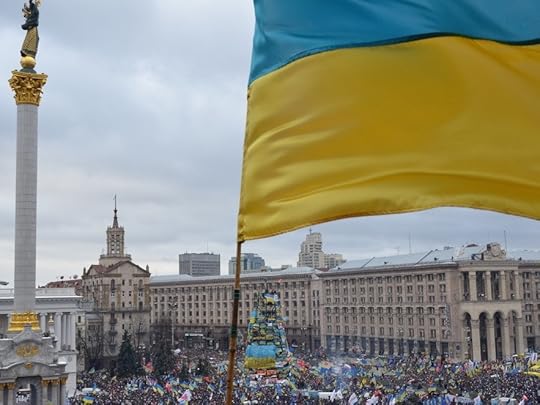 Europe and Central AsiaUkraine
Europe and Central AsiaUkraine
March 23, 2016
Time for Ukraine to Take the Initiative
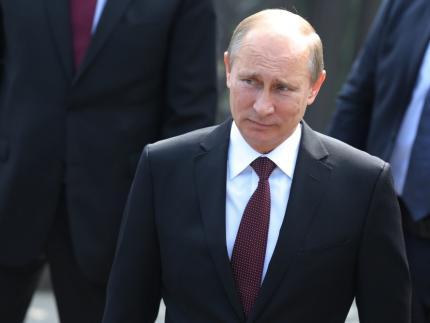
Vladimir Putin’s maneuverings with the West and Ukraine are often compared to a game of chess. The comparison is spot on, with one qualification. Contrary to the image of grandmaster he prefers, the Russian president more closely resembles a loudmouthed barroom player who slams pieces against the board. The effect is intimidating at first, but the best way to beat him is to take a deep breath, stick to your strategy, and play a consistently offensive and defensive game.
Unfortunately, President Obama isn’t very interested in playing chess with Putin. Maybe the State Department and the Pentagon are, but they’re hamstrung by Obama’s apparent indifference. The European Union, almost by definition, doesn’t play well. Indeed, its member states can’t agree on whether the game is chess, checkers, or soccer.
Putin’s bullying and the West’s non-play give Ukraine’s leaders considerable room for maneuver. If Kyiv had a vision of its future, it could stop reacting to events and attempt to settle the war in eastern Ukraine on its own terms. By announcing bold initiatives, Kyiv could take the initiative and shock Washington and Europe out of their complacency or denial.
Consider the stalemate over the Minsk accords. France and Germany are pressuring Ukraine to hold elections in the occupied Donbas even as the Kremlin negates its end of the bargain by violating the ceasefire, arming Putin’s proxies, repressing freedom of speech and assembly, and controlling the Ukrainian-Russian border. The elections would be a violation of every value France and Germany claim to stand for and only ensure that Russia would become a permanent cancer on Ukraine’s body politic.
Rather than play the endless point and blame game, Kyiv could simply state that it has temporarily suspended its sovereign right to the Donbas enclave and will defer the elections to an appropriate international body. The OSCE or the UN would organize, conduct, and supervise the elections from beginning to end. For its part, Ukraine will accept the results as long as independent international monitors declare that the election process was fair and free.
Better still, President Poroshenko could announce that he supports granting the occupied Donbas the status of a fully sovereign region within a confederal Ukraine. The enclave would have its own government, its own budget, its own police, its own economy, its own laws. Kyiv wouldn’t subsidize the enclave, and the enclave wouldn’t subsidize Kyiv. All that would bind them would be some largely symbolic institution, perhaps a powerless council of elders that would periodically meet, sing songs, and be merry.
Putin and his proxies would be cornered. Putin wants the Donbas to weaken Ukraine. If you isolate the Donbas with a confederacy arrangement, the Kremlin’s ability to infect Ukraine will be nullified. And the proxies couldn’t say no: Ukraine would be giving them far more autonomy than they want. In the end, Ukraine would have a bankrupt criminal state on its border rather than a bankrupt criminal region inside its borders.
If that’s too radical, consider a third way to take the initiative: Poroshenko could declare that Ukraine has “suspended” all efforts to reintegrate the occupied Donbas for, say, ten years. No Minsk, no military, no diplomacy—just freeze the status quo. After ten years, the OSCE or UN would oversee a referendum on self-determination in the occupied Donbas allowing the citizens to choose to return to Ukraine, remain independent, or join Russia.
Each of these three variants has the inestimable advantage of giving Ukraine the initiative. Kyiv would propose bold solutions that are consistent with human rights and democratic norms, and Russia and the West would have to respond.
Ukrainian elites must seize the initiative. If they don’t counter Putin’s poor chess play with their smart game, they’ll lose.
OG Image: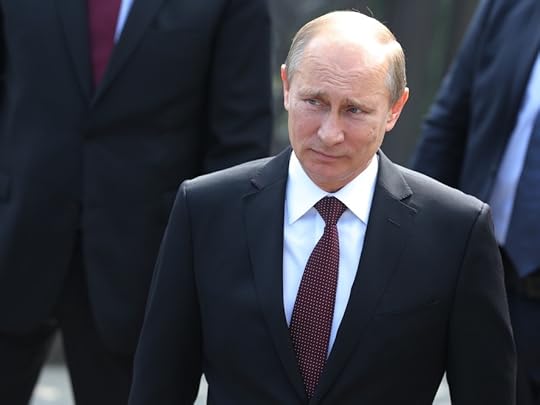 Europe and Central AsiaUkraineRussiaVladimir Putin
Europe and Central AsiaUkraineRussiaVladimir Putin
March 18, 2016
Putin’s Syria Gambit
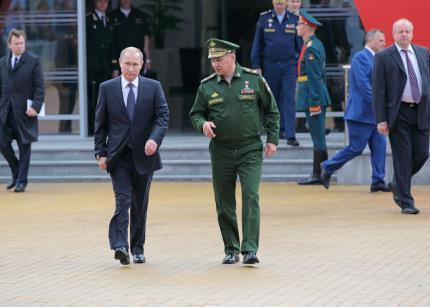
All the hullaballoo provoked by Vladimir Putin’s surprise announcement of a Russian troop withdrawal from Syria misses two important points.
First, given that even Putin’s inner circle in the Kremlin appears not to have known anything about his plans, the episode has reaffirmed the widespread belief that Putin makes all the strategic decisions in the Kremlin. Which is exactly what we would expect from a dictator who models his leadership style on Benito Mussolini’s. Unconstrained by institutions or rules, Putin can invade Crimea, the Donbas, and Syria one day and announce a withdrawal from Syria the other. If he wanted to end the war against Ukraine, he could do so by declaring victory over the “Kyiv junta” and withdrawing his troops. That he chooses not to do so is less the result of a rational calculation of the war’s costs and benefits for Russia than the product of his whim.
Not surprisingly, Putin keeps surprising the world—and, in all likelihood, himself. That’s not leadership, and that’s certainly not genius. That’s authoritarian conceit.
Second, it’s premature to proclaim that the announced withdrawal is a stroke of genius. After all, Putin’s recent abrupt decisions have rarely turned out well. Indeed, many look downright stupid. Take, for example, Putin’s annexation of the Crimea and the destruction of the Donbas. At first, Russians applauded—and some still do. But outside analysts and astute Russians know these foreign adventures have given Russia—and Putin—exactly zero benefits. The contrary is poorer, most of the world regards it as a rogue, and Ukraine has moved westward. What has Russia gained? An impoverished peninsula and 35,000 well-armed proxies in the Donbas.
Likewise, by intervening on Assad’s behalf, Putin raised Russia’s diplomatic stature in authoritarian circles. And if Assad survives, if the peace talks work, if the Syrian opposition cooperates, and if ISIS refrains from taking advantage of the Russian withdrawal, Putin will look good.
Consider four other ifs. If, as is likely, the peace talks bog down; and if, as is likely, the opposition reinforces its positions; and if, as is likely, ISIS attempts to regain lost ground, trumpets the withdrawal as a Russian humiliation, wins more recruits, and launches terror strikes against Russia; and if, as is likely, Assad’s hold on power becomes tenuous once again—then Putin will be forced to re-invade or let Syria collapse. Even his authoritarian admirers will think twice about his smarts.
In sum, Putin’s move isn’t a checkmate, but an extremely risky rook sacrifice. If everybody plays poorly, he wins. If everybody plays just adequately, he loses—big.
I’m betting that the announced withdrawal will be far less of a triumph than the pundits now predict. Perhaps because they’re jaded by the ordinariness of American politics, they are confusing rashness for brilliance.
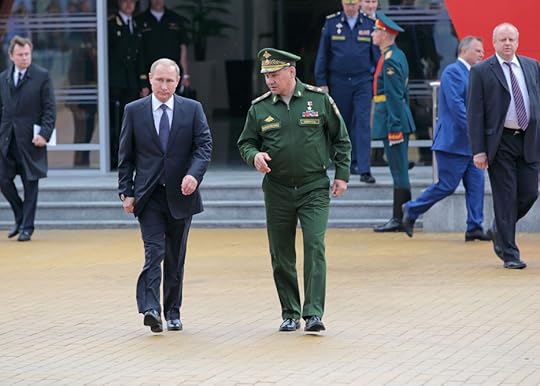 Europe and Central AsiaRussiaSyriaVladimir PutinSyria
Europe and Central AsiaRussiaSyriaVladimir PutinSyria
March 4, 2016
Decentralizing Government Power is Key to Reforming Ukraine
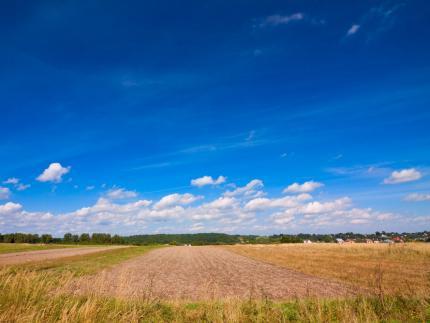
It’s not surprising that Kyiv’s convoluted politics color what we think about Ukraine and its future prospects. But don’t let the turmoil in Kyiv obscure the hopeful developments taking place in Ukraine’s provinces. Take agricultural reform. As Kyiv’s policymakers squawk and squabble, real Ukrainians have to live real lives. And they do, frequently developing innovative new schemes that qualify as no less important reforms than those contemplated and adopted in the capital.
Lviv Province, 39 percent of whose population lives in the countryside, has just adopted an ambitious five-year Complex Plan of Supporting and Developing Agro-industrial Production, developed by the Province State Administration’s Agro-industrial Department, which is headed by the dynamic Nataliya Khmyz, described by her coworkers as a “fount of ideas.” The State Administration is allocating 11 million hryvnia (about $425,000) toward agriculture in 2016. According to Taras Verveha, the head of the Lviv Provincial Council’s Agro-industrial Commission, 1.5 million will pay the interest farmers owe on existing loans; 1 million is earmarked for replenishing the soil; and 8.5 million will serve as low-interest loans for agricultural improvements. Verveha expects agricultural production to increase by 10 percent in five years.
In addition to the 11 million coming from the province in 2016, Khmyz and her colleagues expect Kyiv to provide 16 million, international donors to come up with 6 million, and co-financing partnerships (involving local budgetary allocations and farms) to account for 42 million—for a total of 75 million hryvnia. Since the State Administration intends to spend 86 million hryvnia during the next five years (or about $3.3 million at the current exchange rate), the actual total will likely be seven times as much, or 602 million hryvnia ($23 million).
The Lviv Province Fund for Supporting Individual Housing Construction in Villages, which has been providing villagers with cheap loans for fixing their homesteads since 2000 on a transparent and competitive basis, will administer most of the monies involved (8.5 million in 2016 and 68 million in 2016-2020). The Fund expects to provide 1-to-3-year loans at 5 percent interest (compared to the 30-percent interest offered by banks) to 104 small farmers, individual homesteads, and village cooperatives in 2016 and to a total of 605 in 2016-2020. The interest is earmarked for promoting the program, providing training and instruction, and covering direct administrative costs.
According to Zenoviy Drevnyak, the head of the Fund, the loans will be awarded on the same kind of transparent and competitive basis that has characterized the Fund’s loan-making activity hitherto. Farmers will be obliged to submit detailed business plans to the State Administration’s Agro-industrial Department, which will select those proposals that promise to contribute most to increasing production of milk, fruits, vegetables, and meat and to creating jobs. The Fund will sign contracts with the farmers, provide the financing, and monitor the projects. The Agro-industrial Department’s outside experts will then evaluate the projects on an ongoing basis. The financing will pay for up to 50 percent of the proposed project’s total budget ensuring that the individual farmers share the risks. When farmers eventually pay off their loans, the monies will be ploughed back into the program and go toward financing future agro-industrial projects.
The program’s process, says Drevnyak, has been carefully designed to minimize opportunities for corruption by stipulating that each part of the process—competition, financing, and evaluation—be performed by different individuals or entities. Information about the entire process will be available on a special website; the Fund will also train farmers to develop their business plans. In time, the authorities hope to have a list of the “500 Most Successful Farms” that would serve as models for other farmers and cooperatives.
Perhaps the most promising aspect of the Plan is that it is a local initiative entailing negligible involvement of Kyiv’s heavy-handed, inept, and corrupt bureaucracy. Small wonder that other provinces are expressing great interest in Lviv’s initiative. On March 1, several hundred farmers and entrepreneurs from throughout Ukraine met in the Lviv Arena conference center for an extensive discussion about how to improve agriculture production. The name of the event reflected the hopeful enthusiasm of its participants: “A Million from Each Hectare.”
The road to effective administration is long, and it remains to be seen whether Lviv’s provincial government is up to the task. However, the Agro-industrial Department’s effort to revitalize agriculture has exhibited a degree of professionalism that has eluded Kyiv. The Lviv experiment needs to be monitored, as well supported from within and without. And the clear lesson for Ukraine’s reformers is obvious: cut the central bureaucracy and its intrusiveness—radically.
OG Image:
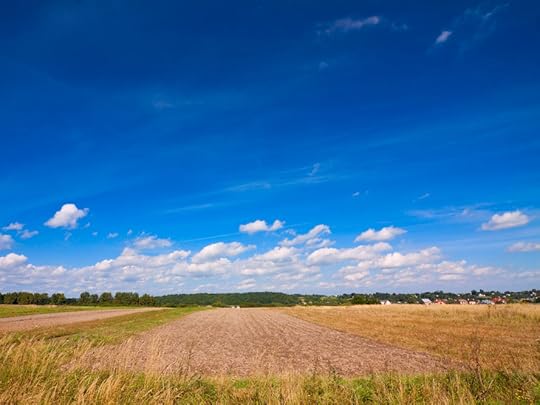 Europe and Central AsiaUkraine
Europe and Central AsiaUkraine
Alexander J. Motyl's Blog
- Alexander J. Motyl's profile
- 21 followers



